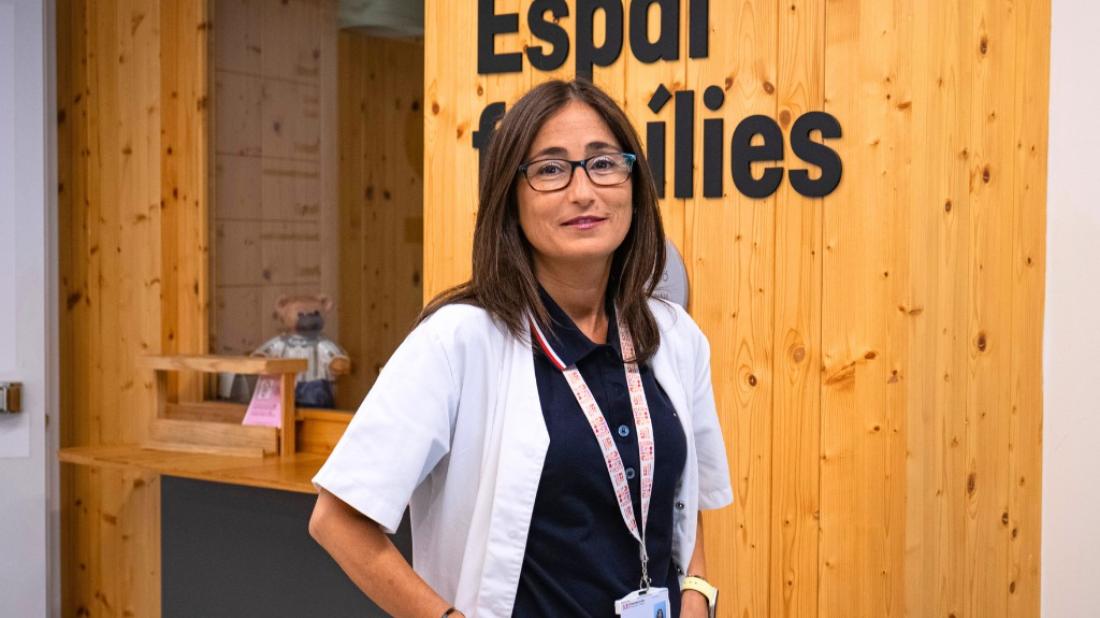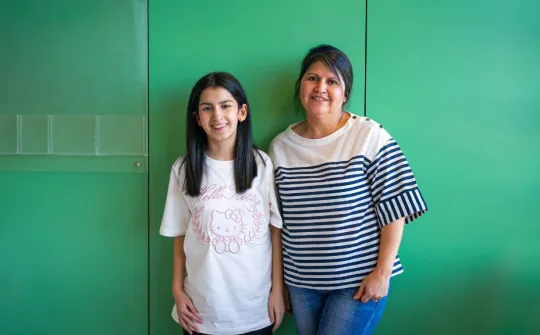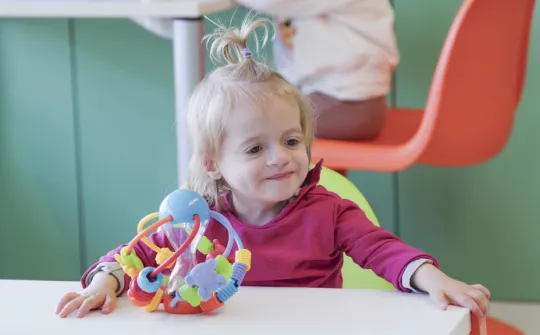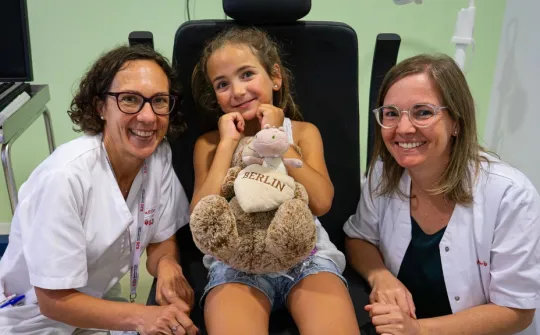
Ana Maria Alonso is the Head of the Social Work Department at the SJD Barcelona Children's Hospital. Her team is responsible for an essential part of the care families receive while their children are hospitalised or receiving treatment. These situations can have varying degrees of complexity, so taking a proactive approach to minimising their impact is vital. Alonso shares her thoughts on both this and other aspects of helping and supporting families.
Why does social work go hand in hand with hospital care?
One of the hospital's main values is a care model that is centred on the patient and their family. We focus not only on the medical side, but we also make sure all of their other needs are covered, such as bio-psychosocial and spiritual needs.
Our place as a leading reference hospital in the field of rare diseases is solidified each day, on both a national and international level. People from all over the world come here in the hope of curing their child.
This global, holistic care model benefits greatly from the involvement of social workers, who help patients and families in their time of need, be that when receiving a diagnosis, or to alleviate the impact of a severe, complex, chronic illness that can debilitate a patient for the rest of their life.
What is the profile of the families you help?
Being diagnosed with a serious disease makes a family vulnerable, regardless of their previous socioeconomic status. While it is true that we help many families who were already in a vulnerable situation beforehand, social workers in healthcare are there for any family receiving a diagnosis of a severe, chronic illness or one with a lifelong impact, as I mentioned before.
It is essential that we break away from this cliché, this prejudice, that social workers only deal with families from poorer or precarious backgrounds.
And what impact does a situation like this have on different profiles of families?
Being diagnosed with a severe illness affects the whole family, in every aspect of their life. It changes family logistics, economic aspects or family relationships. What happens with any other children? Who will take them to school? What happens financially if one parent has to give up work to be able to bring the child to hospital? Are there any resources to provide support?
Many questions also come up regarding the child's education – will the child be able to resume normal schooling? Will they need an at-home teacher? Social workers guarantee a child's right to education, and we must be able to offer it while a child is in hospital, too.
We also have to handle more complex situations. For example, families who are displaced from their usual place of residence, be they national or international families. The majority of these families do not have a support network here. Families from other countries tend to be of middle-lower socioeconomic status in their home country, but when they come here, they find themselves worse off. They come to Spain on a tourist visa that expires after three months, and if they stay longer they become ‘irregular’ status citizens, leaving them unable to get a job or a residence permit. These families need a great deal of support from social workers.
’It is essential that we break away from this cliché, this prejudice, that social workers only deal with families from poorer or precarious backgrounds.’
How do you establish who needs what?
Social workers provide transversal support across all of the clinical departments of the SJD Barcelona Children Hospital.
Let’s say that the Social Work Department is split into four large areas. One would handle chronic disease, another would handle mental health, another would be a mother and child area and the last would handle child abuse and mistreatment, at the ESTIM (Support for the Treatment of Abused Children Team) Unit.
The fact that social workers form part of various multidisciplinary teams across the several clinical specialisms is a huge advantage when attending to families. Why? Because, for example, a social worker who is part of the Oncology Department will know about oncology diseases, how they progress, the various stages a patient will go through, and they can, therefore, anticipate the family’s needs. This staff member is also present at department meetings, offering their social perspective to the work that the healthcare team carry out.
Social workers discern patient and family needs through interview and social diagnosis. Families may be referred to the Social Work Department by the hospital consultant responsible for them, they may come on their own initiative, or by being referred by an external staff member in the community network.
How has the social work team at the hospital grown and changed over time?
In the last ten years, we have grown significantly, increasing from six professionals to 18 social workers. But I do not want to focus on numbers, on quantity. I would like to focus on how we have changed the care model for families, taking a proactive approach and anticipating their needs, working together to empower them and strengthen our ties with the community. We do not want it to be left to families to come to us for help. We would rather take the initiative ourselves in our approach to meeting their needs. This care model requires expert professionals with a comprehensive, proactive vision for the care they provide to families across the different areas of intervention.
What are the main challenges you face in your profession?
Fighting the perception that we only help disadvantaged families. We aim to alleviate the impact of the disease, and, as such, we will help any family that needs the support of social workers. In fact, there are some diseases for which, as per protocol and depending on the diagnosis, the family will first attend an appointment with the social work team and decide themselves whether they require follow-up or not. But no matter what they decide, the family will leave with a contact in the social work team who they can rely on both during their time in the hospital and after discharge. This consultation with a social worker is for anyone, regardless of their socioeconomic status before diagnosis.
Families rate the support they receive from your team very highly. Why do you think that is?
Because we are the common thread. We are the ones who are there for them during their entire time at hospital and, beyond that, also when they return home. We continue to check in with them and provide support, acting as a unifying thread with the SJD. There are some children with several diseases being seen at multiple departments. But we are the go-to team for these families.
This often leads to a very positive relationship. At times they will call you or tell you they need help with something, some practical or logistical issue at the hospital, and you do what needs to be done to help make their life even that tiny bit easier.
‘We perform a social diagnosis and detect social protection or risk indicators through various interviews.’
Is there a case that has stood out to you in particular?
I have thousands of stories that have had a positive impact on me. For example, when a family knocks on your door and tells you they don't need anything, that they just wanted to say hello and thank you for everything you’ve done for them. Or sometimes you get a thank you note or email.
I also remember one boy who spent many months in the ICU. It was a very difficult period, and we feared for his life on several occasions. He is now a teenager, albeit still facing hardship, but he is doing well. When he sees me, he gives me a hug and asks about my children.
The case I remember most was a girl who we helped for a year and a half, and who, in the end, didn't make it. Months later, long after the girl was no longer with us, her family sent me an email thanking me for everything over the last 18 months. This case stands out to me so much because of that family's ability to express such sincere and pure thanks despite the loss of their daughter.
The hospital received a donation of €100,000 for the department from the ‘La Caixa’ Foundation. What does this donation mean for you?
Thanks to this donation from the ‘La Caixa’ Foundation, we can help families who are suffering from the impact of a severe, chronic illness, or one that has lifelong repercussions, and whose family situation is equally complex. For example, unemployed parents who cannot always come to the hospital because they have no money for public transport, or they have no money for the private prescription medication or technical resources. This donation means we can help cover these basic transport, housing, maintenance or hygiene needs.
What are the risk indicators that help you manage cases under your charge?
One of the main functions of a healthcare social worker is to safeguard children and detect social risk or protection indicators. We perform a social diagnosis and detect social protection or risk indicators through various interviews. We assess whether the parents can give the child the attention they need, if they are adhering to medical treatments, if they attend appointments and are involved with the hospital or another department in the community network, if the child attends school, etc. We also look for any indicators of abuse or neglect.
When there are no social protection indicators in the family unit, our next step is always to turn to the extended family (uncles, grandparents, etc.) to see if they could assume responsibility for the child. If, ultimately, we deem there to be no social protection indicators in the family, it is our responsibility to find and provide this protection. In this case, we would inform the competent authority, the General Directorate of Child and Adolescent Care (DGAIA).



